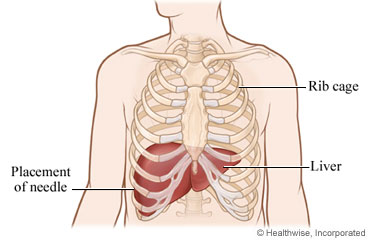Needle Biopsy of the Liver: Before Your Procedure

What is a percutaneous liver biopsy?
Percutaneous liver biopsy is a procedure to take a very small sample of your liver tissue. Then a doctor looks at this tissue under a microscope. They check it for infection or other liver problems.
Percutaneous (say "per-kew-TAY-nee-us") means "through the skin." Sometimes this procedure is called aspiration biopsy or fine-needle aspiration.
You may get medicine to help you relax. You will get a shot of numbing medicine in the biopsy area. Then the doctor guides a needle into your liver to take the tissue sample. The doctor may use ultrasound pictures on a screen to help guide the needle into the liver. When the needle goes into the liver, you may feel a pain in your shoulder. This is called referred pain. It's caused by pain that travels along a nerve near the biopsy area. After the doctor gets the sample, they remove the needle and put a bandage on the spot where the needle went in. The procedure takes 15 to 30 minutes, but the needle is in your liver for just a few seconds.
After the procedure, you will need to rest in bed for a few hours. Nurses will watch over the biopsy site.
You will probably go home the same day, but do not drive yourself. It can take several days to get the results of the biopsy. Your doctor will discuss the results with you.
What happens before the procedure?
Procedures can be stressful. This information will help you understand what you can expect. And it will help you safely prepare for your procedure.
Preparing for the procedure
Understand exactly what procedure is planned, along with the risks, benefits, and other options.
Tell your doctors ALL the medicines and natural health products you take. Some of these can increase the risk of bleeding or interact with other medicines.
If you take blood thinners, ask your doctor if you should stop taking it before your procedure. Make sure that you understand exactly what your doctor wants you to do.
Your doctor will tell you which medicines to take or stop before your procedure. You may need to stop taking certain medicines a week or more before the procedure, so talk to your doctor as soon as you can.
You will have blood tests before the liver biopsy to see if you have any bleeding or blood clotting problems. You may also have an ultrasound or a CT scan of the liver to check the best place to insert the biopsy needle.
If you have an advance care plan, let your doctor know. Bring a copy to the hospital. If you don't have one, you may want to prepare one. It lets your doctor and loved ones know your health care wishes. Doctors advise that everyone prepare these papers before any type of surgery or procedure.
What happens on the day of the procedure?
Follow the instructions exactly about when to stop eating and drinking. If you don't, your procedure may be cancelled. If your doctor told you to take your medicines on the day of the procedure, take them with only a sip of water.
Take a bath or shower before you come in for your procedure. Do not apply lotions, perfumes, deodorants, or nail polish.
Take off all jewellery and piercings. Take out contact lenses, if you wear them.
At the hospital or surgery centre
Bring a picture ID.
Your healthcare provider will keep you safe and comfortable. You may get medicine that relaxes you or puts you in a light sleep. The area being worked on will be numb.
The procedure will take about 15 to 20 minutes.
Going home
- Be sure you have someone to drive you home.
- If you have no problems after the procedure, you can go home and rest for the day. Have a responsible adult take you home (do not drive yourself). If you live out of town, it's a good idea for you to stay somewhere overnight within 1 hour of an emergency care hospital. Don't drive for the next 24 hours or while you're taking strong pain medicine.
- You will be given more specific instructions about recovering from your procedure. They will cover things like diet, wound care, follow-up care, driving, and getting back to your normal routine.
When should you call your doctor?
- You have questions or concerns.
- You don't understand how to prepare for your procedure.
- You become ill before the procedure (such as fever, flu, or a cold).
- You need to reschedule or have changed your mind about having the procedure.
Where can you learn more?
Go to https://www.healthwise.net/patientEd
Enter U961 in the search box to learn more about "Needle Biopsy of the Liver: Before Your Procedure".
Adaptation Date: 03/02/2022
Adapted By: Alberta Health Services
Adaptation Reviewed By: Alberta Health Services
